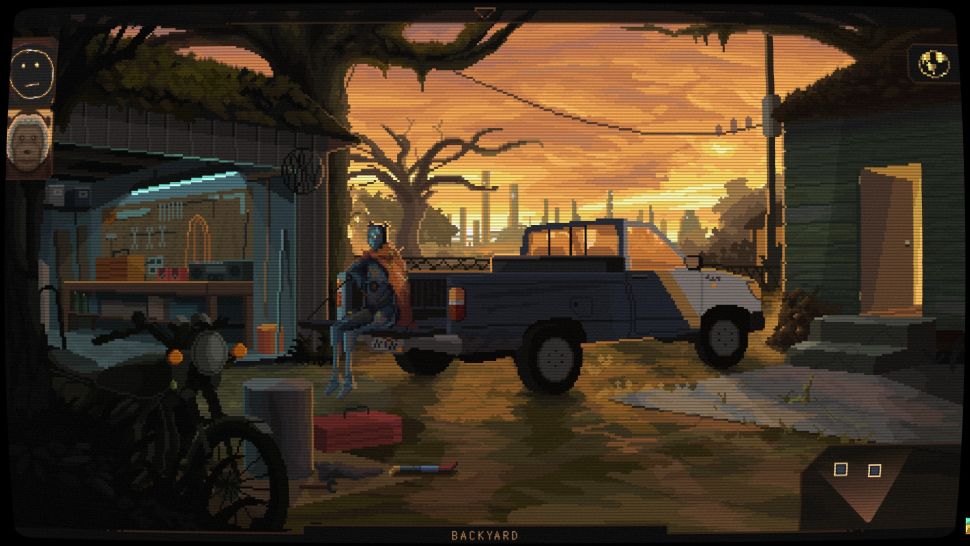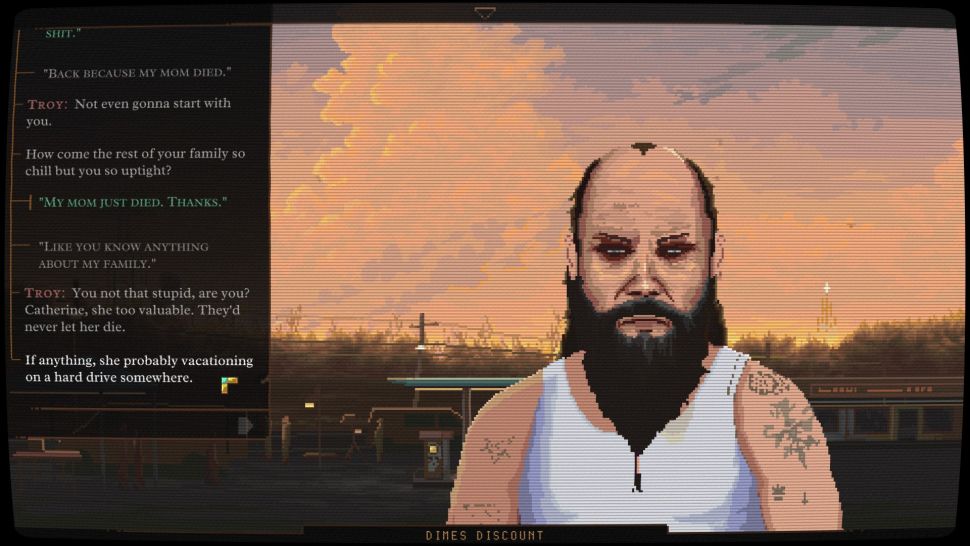Norco, the new point-and-click adventure praised for its gorgeous pixel art, sublime writing, and poetic exploration of class, identity, faith, and materialism, may be familiar to you. You may have heard about its blazing social commentary on capitalism and environmental destruction in the real-life town of the same name, Norco, Louisiana, which is home to a powerful oil refinery that both feeds and bleeds the people who live there. When people discuss Norco, they frequently mention its deft use of science fiction, its hyperlocal focus on a specific region of the Deep South, and how much it resonates as a universal story about place and personhood.
My favourite Norco moment is far less noble. It occurs in an abandoned mall in Act 2, where the player sows discord among the Garretts, a cult of insecure boys. I gleefully tick off boxes for Unethical Modern Behavior, using a voice memo app on my in-game phone to secretly record the shit people say, removing context and using it to turn them against each other. Finally, a game that understands humanity's weakest, pettiest, and most chaotic aspects. Finally, I feel recognised.

Norco is the first game from the Geography of Robots collective, which was founded by writer/designer Yuts, who was born and raised in Norco. Kay, a young woman, returns home to Norco to find her frail brother, Blake, in the aftermath of their mother's death. Kay has been a nomad, fleeing her roots and surviving in a post-apocalyptic America characterised by homegrown militias, widespread gentrification, and fraying infrastructure. The player alternates between Kay and her mother Catherine, who is dying, as they become entangled in a surreal, tech-noir mystery. Norco is profoundly sombre and bitingly funny in its examinations of real-world problems, including a darkly funny look at the invisible moving parts of the average gig economy job.
There aren't many mechanics beyond a few mini-games and small QTEs, in the best tradition of old-school point-and-click adventures. The puzzles are simple enough by point-and-click veteran standards—if you've played enough of them, it's really about how and what the developer is hiding on the screen—to give you a sense of accomplishment when you solve them. Playing Norco requires a complete dedication to the story. To that end, each character in the ensemble cast has a distinct persona—at least to the extent that their screen time allows. Yuts' gift for dialogue and humour brings to life every laid-back security guard, prickly neighbourhood drug dealer, blasé partygoer, and insufferable Airbnb guest as small but scathing caricatures of the modern social scene.
Private investigator Brett LeBlanc, as well as Catherine's high school friend Keith, are particular treasures—LeBlanc, in particular, is a neat character study into the value of unexpected community ties and found family as Kay is forced to re-examine her relationship with her home. Catherine's chapters have a cosy sense of siblingry when she runs into these old friends, which struck a chord with me as an only child who is all too familiar with the idea of projecting family bonds onto friendships (or understanding but never wanting to acknowledge these ties at all).

The mindmap system—a connect-the-dots-style web used to nudge the story forward—is a simple but effective way of dressing up Kay's journey's (nominal) role of player agency. It reflects both the player's and Kay's desire for clarity, with the added benefit of serving as a repository for the player's major plot threads. On another level, the mind map is a thought-provoking alternative to point-and-click games that rely on manipulating the game environment and collecting items - it forces the player to internalise and contextualise Kay and Catherine's decisions on a deeper level. It's worth noting that Norco's physical environment has already been irreparably damaged, and the only thing left to do is band together with those who can survive and subvert.
This isn't to say that most point-and-click adventures are mindless—I adore what Wadjet Eye has done with storytelling and characterization in Primordia and Unavowed. But it's possible that Norco's roots in a real hyperlocal setting, drawing on the devs' lived experiences, as well as issues like class divide, gentrification, and alienation, force us to reconsider our relationship with videogames as an escapist pleasure medium. I've never been to Louisiana, but probing Kay's mindmap brings up uncomfortable memories of my own family and hometown. Norco provides a refreshing challenge within its chosen genre in the numerous ways it forces the player to pay attention to their own problems without turning away.

Understanding the Garretts, who I believe are the true protagonists of the story, is crucial to understanding the heart of Norco. They progress from pernicious "mall Nazis" to a gang of degenerates attempting, in their own misguided way, to realise a sense of self and community. Because of the variety of subcultures and petty, painfully human foibles that thrive among them, they are perhaps the easiest characters on which players can imprint themselves. Each Garrett subtype has a depth that goes beyond standard point-and-click characterization, which is enhanced by Yuts' unparalleled ability to build empathy and connection between the most disparate social identities.
On a good day, Norco is a haven of beautifully evocative storytelling that welcomes any player into its world. On a bad day, it's a sobering but loving portrait of a modern dystopia—a community on the verge of major change. On a more personal level, it's a game about figuring out who we are and what the internet has made us into—how this digital constellation of fragmented subcultures has shaped how we see the world and our place in it. There are few games like Norco in the world, and it unquestionably belongs in the top tier of narrative experiences in the medium today.





Post a Comment